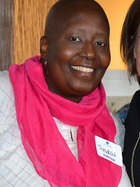
By most accounts, Theodosia did everything right. After her mother was diagnosed with stage 4 breast cancer in 1985, she was vigilant about getting her annual mammograms. So when Theodosia herself was diagnosed with stage 3 triple negative breast cancer, after nearly 20 years of routine screenings, she was shocked. “I went back and wanted to know, how did this get missed? What was determined was that based on the size of your breast, if your breasts are large or loose or cystic, there’s about a centimeter that can be missed during regular screenings. And that was where the tumor was.”
When Theodosia’s doctors initially saw a dark spot on her tests, they didn’t think there was cause to examine it further. But Theodosia felt in her gut that something was wrong, and insisted on follow-up screening. She asked her insurance provider to recommend a cancer center in her area that had high ratings from African-American patients with cancer, a practice that she advocates that others do when they are looking for a treatment facility. Her doctors were very responsive to her concerns, and when she received her results, she recalls that one of them told her: “Following a patient’s gut is primary, and you just proved it. The tumor was located on your chest wall, right in front of your heart. And if it had grown, it would have killed you.”
Theodosia came to CancerCare through our Hopeline, where she spoke with one of CancerCare’s oncology social workers about how to find funding and manage her stress while caregiving for her father, who has Alzheimer’s. “Your phone support system helped me at the highest level,” she says. “CancerCare helped with filing for disability, since my job didn’t explain anything about how to do that. CancerCare even spoke with my oncology department to help me get grants.”
In June 2015, Theodosia attended CancerCare’s first Survivorship Celebration. As the daughter of a woman with cancer, and as someone with her own daughter, she was particularly moved by CancerCare client Zoe Mintz’s speech about coping with her mother’s cancer. “There was a relaxed atmosphere at the event that gave you the opportunity to meet people,” she says. “I came alone and like six people said bye to me when I left!”
It’s been almost two years since Theodosia was diagnosed, and her focus now is learning how to live with it, instead of viewing it as a death sentence. “When I was first diagnosed, I honestly thought that one day my cancer would go away. Now, I honestly don’t care if I ever hear the word cancer-free again. I have to live this. My advice to others is to stop reaching for a cancer-free diagnosis. Instead, how about we learn to live with this disease?”
